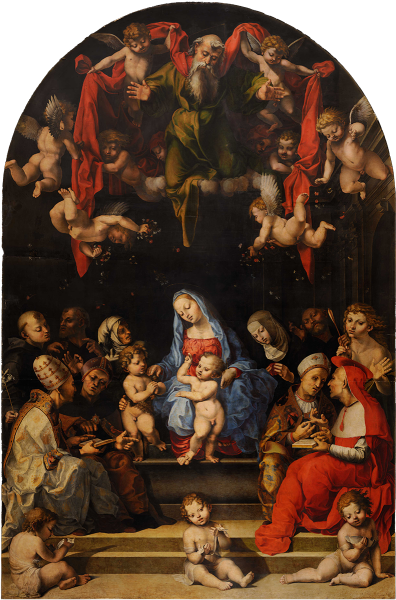Disputation over the Immaculate Conception
Technical Details
-
Title
Disputation over the Immaculate Conception -
Author
Girolamo Genga -
Year
1516 – 8 -
Dimensions
cm 438 × 290 -
Inventory
159 -
Room
XXVII
Girolamo Genga (Urbino, 1476-1551) worked between Urbino, Siena, Florence, Romagna, Rome and Pesaro. Trained in Perugia with Signorelli and Perugino, he then reworked the influences of Pinturicchio, Sodoma, Fra’ Bartolomeo, Raphael and Michelangelo in an anticlassical way.

The large panel, executed between 1516 and 1518, was conceived for the church of Sant’Agostino in Cesena, within a monumental “machine” that also framed other paintings: the three compartments of the predella with stories of St. Augustine, the cymatium depicting the Annunciation, and at the base of the columns two figures of Augustinian Blesseds, now lost (Fig. 2).

In 1809, with the Napoleonic requisitions, the Dispute of the Doctors of the Church arrived at Brera.
In recent years the painting, affected by cracks in the support and blurred by retouches and altered varnishes, has been the subject of a complex restoration project, to carry out which a structure has been set up in room XXVII of the museum that makes it possible for visitors to follow each stage of the restoration.
The restoration is accompanied by accurate photographic documentation, and scientific investigations that have deepened our knowledge of the painting technique and the state of conservation of the work.

Right top, fig. 5, microscope image of the blue background of the Virgin’s mantle; bottom, fig. 6, stratigraphic section of the blue background of the Virgin’s mantle
Particularly interesting is the result obtained with the technique of infrared reflectography (IRR 1000-1700), which makes visible important aspects of the artist’s painting process, such as the drawing underneath the pictorial layers performed to set up the composition. The very high-resolution IRR image has been reproduced in full size and and can be seen next to the work being restored.
The composition of the Dispute was initially studied on a large preparatory cartoon, now lost. Later the image was brought back to the surface of the panel using the dusting technique.

Thanks to IR reflectography, it is possible to reconstruct exactly the tracing reported by the cartoon on the plaster preparation of the panel, since both the dots of the dusting and the drawing made to connect them are perfectly legible: a thin and precise stroke that goes over the dots and joins them in a continuous line, accurately describing the folds of the robes, the expressive lines of the faces and every detail of the hair.
The intervention began with the restoration of problems in the wooden support, which caused cracks and small color falls, and continued with the restoration of the pictorial surface.

The restoration is made possible through the generous support of the Andreotti & Brusone Philanthropy Fund.
Diagnostic investigations were carried out by: Brera Art Gallery Restoration Laboratory (IRR 1000-1700 nm, IRFC, digital microscope); DIART Laboratory, Dept. of Physics, University of Milan (VIS, UVF, NIR 950-1000 nm, IRFC, FORS, XRF); Archaeometry Laboratory, UniMib Department of Materials Science (XRF, Raman Spectroscopy); CSG Palladio S.r.l. (microstratigraphic analysis); Haltadefinizione (very high definition).



